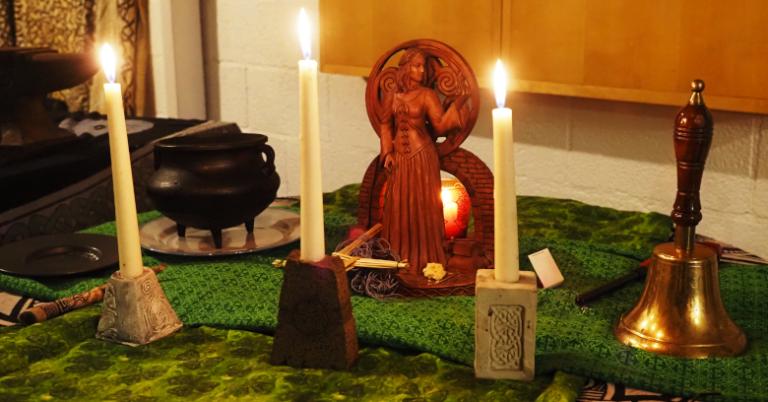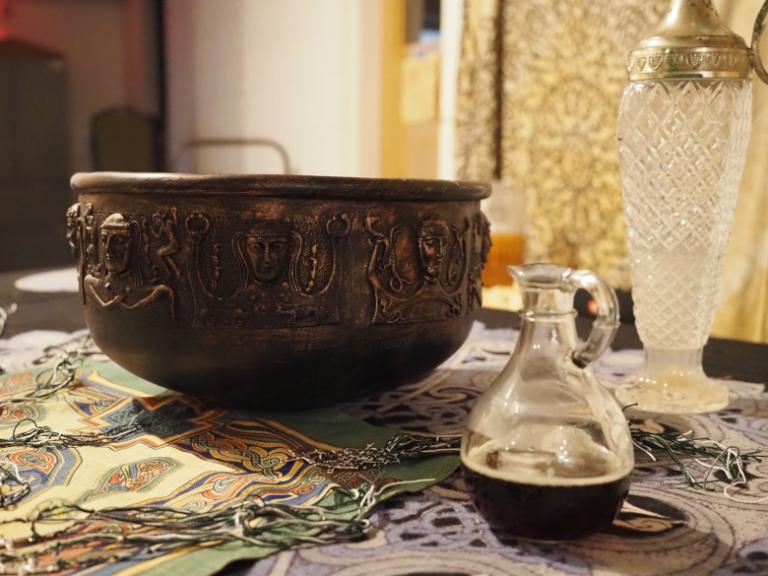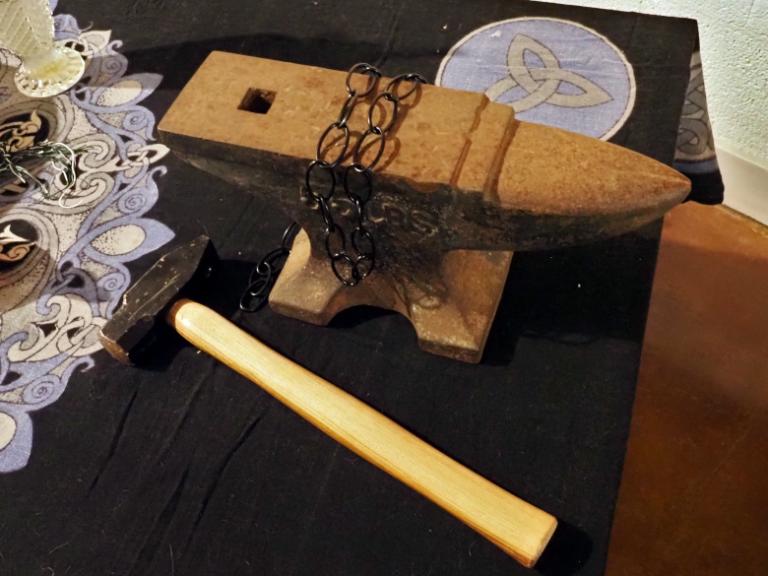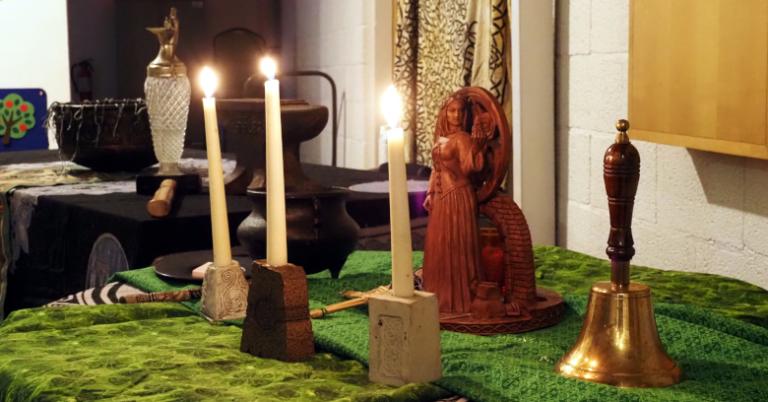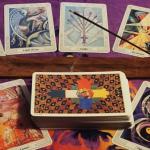Denton CUUPS had 22 people at our Imbolc ritual last Saturday night.
Before the pandemic I would have been horribly disappointed with such a low turnout. Three years after the world shut down – and a day and a half after an ice storm finally cleared – it felt good and right. Religious groups of all persuasions are struggling to rebuild – our small local Pagan group is no exception. But we’re still here for those who want to be part of what we do, and we plan to remain here for the foreseeable future. For this year’s Imbolc, 22 was enough.
No, it was more than “enough” – it was plenty.
Paganism in particular and religion in general are becoming more of a solitary thing. People want to do their own thing, on their own time, for their own reasons. There’s nothing wrong with that. But I love group ritual. I love participating in it and I love leading it.
After the Imbolc ritual, I was talking to someone who had questions about what we did and why we did it. As we were talking, it occurred to me that the primary goals of this particular ritual are the goals of religious rituals in general. They’re part of why I keep coming back, and why I encourage others to participate in group rituals whenever they can.
Cynthia Talbot wrote and led this ritual. I often call the liturgy “mine” and it is, in the sense of “this is the liturgy I use.” But we developed it together over the past 15 years or so. In particular, she wrote the main working for this year’s Imbolc circle.
Locating our place in the universe
Most modern Pagan rituals begin by casting a circle and calling the quarters. I prefer to say “inviting the spirits of the elements and direction.” ADF and some other groups prefer a three-part arrangement. Either way, part of this is a highly-condensed creation myth. But another part is a statement that “we are here.”
We light the central fire – an actual fire when we’re outside, a candle or other small fire when we’re inside. We say the words “this fire is for us the intersection of all times, all directions, and all worlds. We stand at the sacred center, and by this fire we part the veil between the worlds and step into the Otherworld, the world of the Gods and ancestors. We make this offering, that our journeys may be safe and fruitful.”
I often remind people that humans are not the center of the universe – it’s not all about us. But when we do ritual, we stand at the center of the universe. The center is not us – we are at the center.
Establishing a community
The fire is more than a mystical center. It’s also an invitation. Campfires were humanity’s first magic circles, providing light and warmth and protection against the dark and all the predators that lurk in it, human and otherwise. Which is not to demonize the dark, just to say that wolves can and will eat you if you don’t see them soon enough.
This establishes us as a community – even if this particular community only exists for an hour. We are Pagans, polytheists, and animists in a society that is nominally Christian and functionally atheist. This is our community and “we welcome all who come in love and friendship to honor the Gods, our ancestors, and the spirits of this place.” We are not alone – at the very least we have each other.
But we also have much, much more.
Maintaining spiritual relationships
Then we work to form and maintain relationships with our spiritual allies. We invite the spirits of the land where we are – those who share this place with us. We try to show them we’re honorable allies and not just another bunch of clueless humans despoiling the land.
We invite our ancestors of blood and our ancestors of spirits. Some we knew in this life, some we know only their names, and some we can only know through spiritual connections. Without them we quite literally would not be, and so we owe them a debt of gratitude.
And we invite the Fair Folk. That’s not a typical thing in most Pagan groups. Many advise against it, and rightly so. We do it because this group has a long and complicated relationship with themselves and they’ve made it quite clear they expect our public acknowledgement. So we do.
We practice hospitality. When we invite spiritual guests to join us, we offer them food and drink. We know they don’t physically need the beer we pour in their honor, but the act of offering shows our respect to them.
Honoring the Gods
Every ritual I lead (and most at Denton CUUPS no matter who’s leading) has a “deity of the occasion.” We cannot honor all the Many Gods (there are too many for our limited focus and resources) but we can honor Someone who is especially meaningful to us on this day.
For Imbolc, this is Brighid. This is Her day, plus She’s always been “first among equals” in this group. We make invocations and offerings, and we offer words of thanksgiving and praise.
This is worship, in the literal sense of “proclaiming what is worthy.” The Gods are worthy. Brighid is worthy. We want to encourage Her to give us Her blessings, but more than that, we want to facilitate Her presence in our lives.
The main working – magic to improve our lives
Sometimes our main working – the centerpiece of the ritual – is simply an act of individual and community worship. Other times there’s a magical working.
Our main working this time was “breaking the chains.” We placed a chain on an anvil and let people pound it with a hammer. It broke – many times. This is sympathetic magic (“this is like that, therefore this influences that”). It was done in alignment with the themes of Imbolc and the stories and attributes of Brighid. She is – among many other things – a Goddess of the Forge. I sometimes speak of how She will put people on her anvil and shape them into something different – something more.
A hammer and an anvil can literally break chains. And so by doing this, we inspire and enable the participants to break the chains that bind them, whether they are internal chains of self-limitation or external chains placed on them by unjust systems and governments.
Will this magic change votes in the Texas state legislature? On its own, it’s highly unlikely. Combined with other magical and mundane efforts, maybe. Will it give the people who were there the wisdom and strength to do what they need to do to take care of themselves? It will certainly help.
A community can do what a solitary cannot
We can light our own candles and start our own fires. We can honor our Gods and ancestors. I do that on a regular basis, and I hope you do too. We can work magic, and some magic is best worked alone.
But other magic is best worked in community.
The magic of 22 is stronger than the magic of one.
And sometimes, what’s most important is to be reminded that whatever we face, we do not face it alone.
Brighid, Goddess of Many Names, Lady of Forging and of Healing, we thank You for Your presence, Your inspiration, and Your blessings. May we always honor You in freedom and in power. Hail and farewell!
For further reading
4 Necessary Elements of Group Ritual (February 2022)
The Evolution of My Pagan Ritual Liturgy (May 2020)
8 Essential Elements of Good Pagan Ritual (October 2019)
“I Didn’t Expect It To Be So Real” – The Power of Good Public Rituals (May 2019)
Why I Still Cast Circles and Call Quarters (October 2017)


